May 24, 2025 | 16:24 GMT +7
May 24, 2025 | 16:24 GMT +7
Hotline: 0913.378.918
May 24, 2025 | 16:24 GMT +7
Hotline: 0913.378.918
People visiting Kien Giang Province will find it strange that at the headquarter of a communal People's Committee, there is an additional office with a board on which cited some words: "Economic and Technical Team". They were told it is the working room for the commune’s agricultural extension team who are tasked to help the locality organize production, transfer technology, and work closely with farmers in scheduling their crops and preventing pests and diseases…
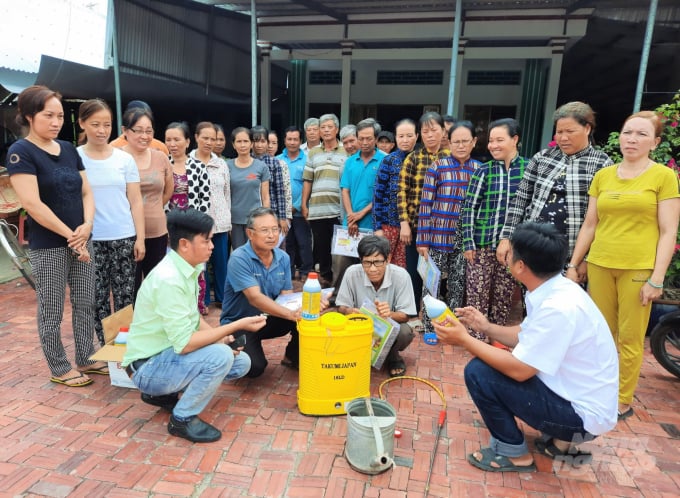
Agricultural extension officials from the Economic and Technical Team in Tan Hiep District, Kien Giang Province train farmers on how to use chemicals in preventing pests from crops and livestock. Photo: Trung Chanh.
The working room is also a place where local agricultural extension officials directly consult farmers on production techniques. Each Economic and Technical Team (ETT) is arranged with 3 agricultural extension officials (AEOs) being skillful in three areas of cultivation - plant protection, animal husbandry - veterinary medicine, and aquaculture. If farmers need to learn anything about the fields they are pursuing or about technology, just go to the commune to get full advice.
When the crop comes, the AEOs will inform farmers about the crop schedule, build production models, and advise on the transfer of new techniques. During the crop, the AEOs will regularly visit the fields with farmers, recommending them to apply pest control measures... Thanks to that, for many years, almost no serious effect of pests was reported on large cultivation areas of Kien Giang.
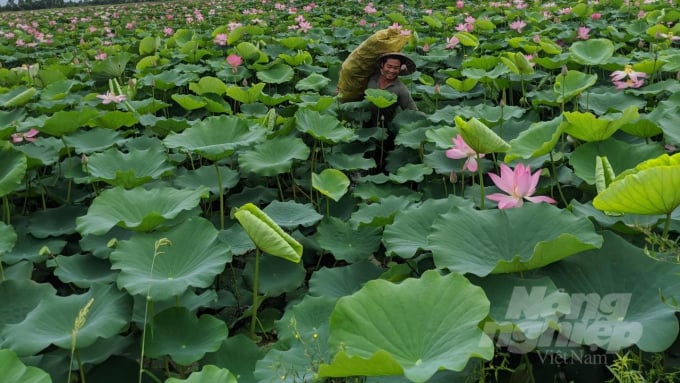
A model of crop conversion on inefficient rice land is carried out by the Kien Giang Agricultural Extension Center in Giang Thanh District. Photo: Trung Chanh.
Mr. Hoang Trung Kien, Director of Kien Giang Agricultural Extension Center (AEC), said that 116 among 144 communes, wards, and towns in the province currently have their own ETTs.
As a result, Kien Giang has a complete system of agricultural extension from the province, district to the grassroots levels, forming a unified and smooth network, so the implementation of political tasks is undergoing fast and conveniently. With great efforts, high solidarity, and determination of the whole network, the province’s agricultural extension has achieved positive results in many fields, contributing to the development of its agricultural industry.
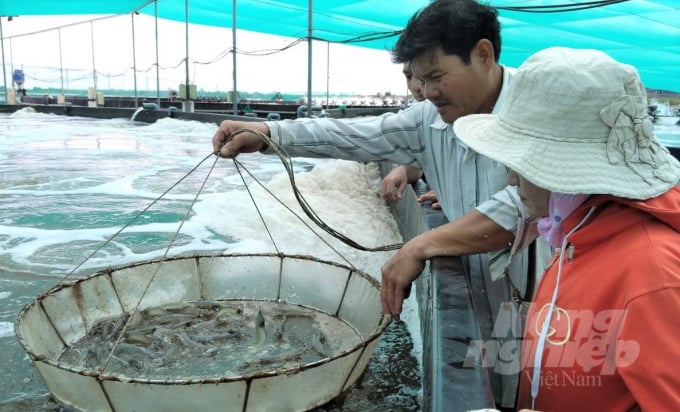
A model of high-tech shrimp farming supported by the Kien Giang Agricultural Extension Center and transferred to the Long Xuyen Quadrangle has received enthusiastic responses from farmers. Photo: Trung Chanh.
According to Mr. Kien, to have a complete agricultural extension system like today, it is a long story of more than 20 years of persistent construction, in which, it took 11 years of pilot operation and evaluation on staff under contracts with no salary increase. To develop agricultural production, in 2000, the People's Committee of Kien Giang Province decided to experimentally establish an ETT model, located at communal People's Committees to accompany farmers working in the fields and transfer techniques.
After many conferences and meetings to evaluate the performance of the ETTs at the communal level, Kien Giang affirmed that this was really a very necessary force for a locality to promote its strengths in agricultural development. In 2011, the provincial People's Committee approved a policy to add members of the ETTs to the subsidiary payrolls, receiving salaries and other official benefits according to regulations.
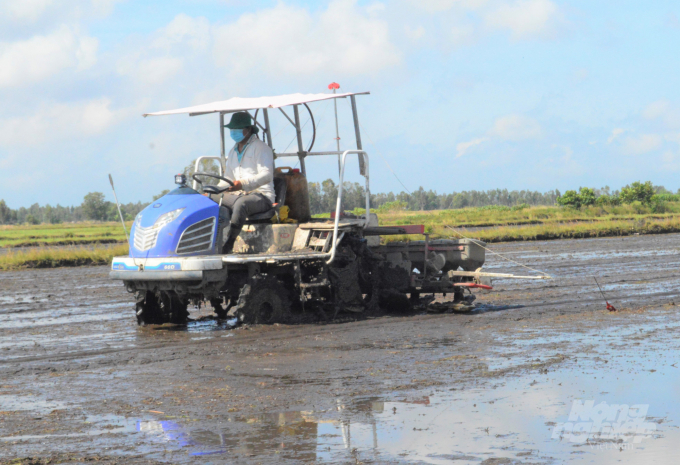
A model applying mechanization in rice production is carried out by the Kien Giang Agricultural Extension Center. Photo: Trung Chanh.
Speaking about the role of local AEOs, Mr. Kien assessed this as the main force performing the task of communicating, transferring technical advances, and building clubs of good farmers and fishermen. They can organize and participate in seminars, fairs, contests, and exhibitions as well as collect experience in agricultural production, forestry, and fishery.
In addition, the official said, this is the force that helps build production models and application of new technical advances, using new varieties with high yield, quality, and economic efficiency then guide farmers and fishermen to replicate in mass production. At the same time, it is working closely with functional agencies and organizations to launch a movement emulating the production and application of technical advances in developing comprehensive agriculture.
Innovation and creativity in agricultural extension work
Not only focusing on developing human resources, but Kien Giang's agriculture sector is also concentrating on renewing agricultural extension work, shifting from the agricultural production model to the agricultural economy. The agricultural extension staff not only have professional qualifications and practical experience but also constantly update their professional knowledge, agricultural extension skills, and economic thinking in agricultural production...
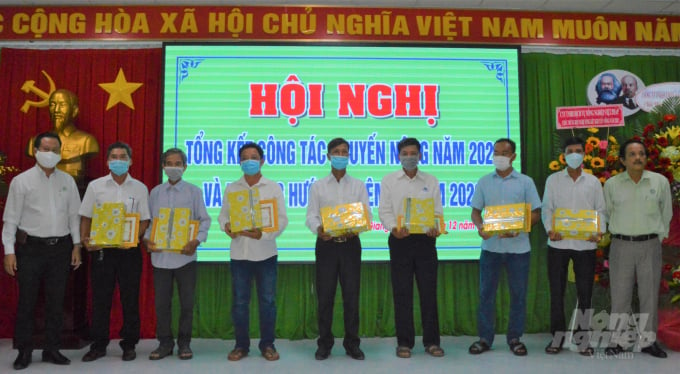
Mr. Hoang Trung Kien (first right), Director of Kien Giang Agricultural Extension Center, presents gifts to farmers who have effectively implemented the agricultural extension models in 2021. Photo: Trung Chanh.
With practical contributions to the strong development of local agricultural industry, the Kien Giang AEC and its director, Mr. Hoang Trung Kien, were awarded a certificate of merit by the Ministry of Agriculture and Rural Development.
The director of the Kien Giang AEC had an initiative of using organic fertilizer with sugarcane sludge to improve the yield of rice grown on saline soil in An Bien District. This initiative has effectively improved the use of saline soil for agricultural production, helping increase crop yields. At the same time, it has a positive effect on saline soils in terms of ecological, social, and economic aspects, helping farmers cultivate more stably, efficiently, and sustainably in the U Minh Thuong area, Kien Giang Province.
Every year, Kien Giang AEC focuses on implementing dozens of programs, schemes, and projects... Specifically, in 2020, a total of 64 agricultural extension models have been implemented on a total of 12,271ha of rice; 2,465 ha of shrimp-rice, fish-rice, shrimp-crab– rice and shrimp-pineapple; 140ha of vegetables; 308ha of fruit; 159 breeding sites, 115 aquaculture sites and 95 unit of mechanization. It has organized 7 rural vocational training classes, 46 VnSAT project training courses, and 19 production units qualified for agricultural practice VietGAP, GlobalGAP, and organic standards on 11 products.
Not only performing its professional tasks, but the Center also focuses on cooperation with research institutes, universities, domestic and foreign organizations, and individuals to attract investment, technology, and practical scientific research for local agricultural and fishery extension work. It has fully and effectively implemented agricultural and fishery extension programs and models assigned by the National Center for Agricultural Extension...
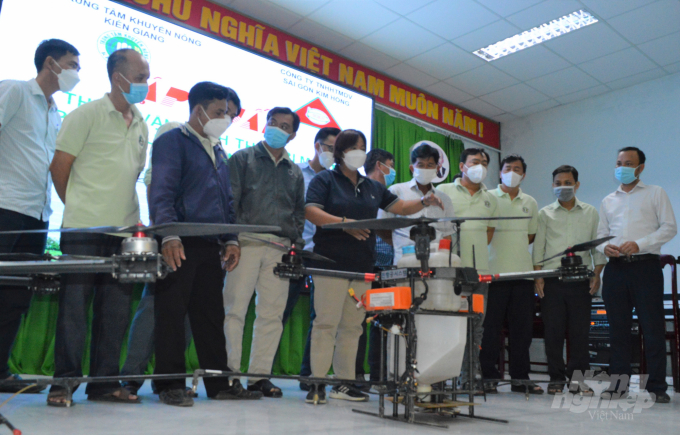
A training course on drone control for agricultural extension officials and farmers is conducted by Kien Giang AEC in collaboration with enterprises. Photo: Trung Chanh.
Kien Giang is not only leading in rice production in Mekong Delta but also pioneering in aquaculture, especially brackish shrimp farming in coastal areas. Therefore, fishery extension activities are always among the province's key targets. “Research and effectively develop shrimp-rice models and build collective brands in the U Minh Thuong region, Kien Giang Province” is one of the initiatives by Mr. Hoang Trung Kien, director of the Kien Giang AEC. His project is highly appreciated with practical efficiency.
Currently, Kien Giang has 116 ETTs operating in 100% of key communes of agricultural production. The total number of AEOs at the ETTs has reached 279 (accounting for 73.4% of the whole personnel system) of whom 60% possess a university or higher degrees and 218 among 279 members of the ETTs have joined the Communist Party. They are the force that can become additional human resources for communes. They are often selected as Vice Chairman of the Commune People's Committee in charge of production.
Translated by Trang Nguyen

(VAN) The People's Committee of Tra Vinh province has approved an adjustment to the investment policy for the Green Hydrogen Plant project, increasing its area to approximately 52.76 hectares.
![Reducing emissions from rice fields: [2] Farmers’ commitment to the soil](https://t.ex-cdn.com/nongnghiepmoitruong.vn/608w/files/news/2025/05/05/dsc08881jpg-nongnghiep-140632.jpg)
(VAN) Clean rice cultivation model in Thuong Tan commune, Bac Tan Uyen district, is assisting local residents in achieving sustainable agriculture by substantially reducing costs, increasing productivity, and protecting the environment.

(VAN) At the conference to disseminate Resolution No. 68, AgriS introduced its digital agricultural ecosystem and reaffirmed its commitment to accompanying the Government in promoting private sector development and sustainable agriculture.

(VAN) 'Blue Ocean - Blue Foods' initiative is designed to restore marine ecosystems and establish sustainable livelihoods for local communities by cultivating a minimum of 1,000 hectares of cottonii seaweed in the first three years.
/2025/05/21/4642-3-112707_603.jpg)
(VAN) The V-SCOPE project has made direct contributions to three out of six pillars of the Comprehensive Strategic Partnership between Vietnam and Australia.

(VAN) Facing the threat of rabies spreading to the community, Gia Lai province urgently carries out measures to vaccinate dogs and cats on a large scale.

(VAN) Disease-free livestock farming not only protects livestock herds but also stabilizes production and livelihoods for many farmers in Tuyen Quang.